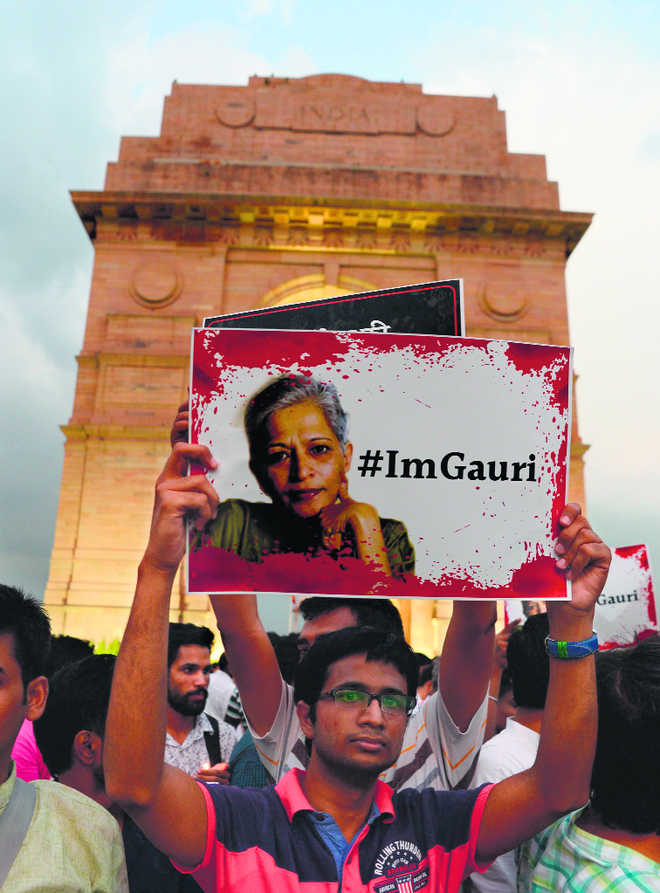
Sandeep Dikshit
Gauri Lankesh did not start out like that though she had inherited iconoclasm from her father. Hers must have been a natural progression from a liberal, fun-loving teenager into a crusading activist. Someone who minced no words regardless of the time and occasion at a time when the bazaars of small-town Karnataka were slowly being turned into a resentful laboratory of bigotry, intolerance and strife. There is a touch of melancholy as Chidananda Rajghatta narrates the increasing illiberalism of India from the late 1970s when he first met Gauri Lankesh and continued the friendship through a short-lived marriage till she was shot dead at her home.
There is an insight, too, into the politics of Karnataka who we all thought was placid, riding on a past defined by majestic, spotless and intricately crafted temples and its present by the massive IT metropolis of Bengaluru. Rajghatta brings a strong whiff of the blasé, bohemian world of litterateurs, led by Gauri’s father, the intellectual churning within along with its petty rivalries. Lankesh, Gauri’s father, was cut from the socialist cloth which meant an inveterate optimist even if his brand of politics was well past its shelf life. It was inevitable that the doggedness of this brand of ideology rubbed on Gauri.
Gauri chose a side at a time when the slow spiral of polarisation began in the run up to Babri Masjid demolition. Her stand that conceding the demand for a Ram Temple will lead to thousands of similar right-wing demands was proved correct 25 years later when Hindutva’s local chapter sought to dismantle the shared inter-faith places of worship. Even the scrapping of Tipu Jayanti celebrations, according to Gauri, was an exercise in appeasement by the Congress.
After a short stint in Delhi, Gauri returned to man the ramparts of the magazine her father had launched while continuing to tilt at every windmill of injustice she came across. The right was unrelenting in permitting her to have her say by trying to straitjacket her with court cases filed in far-flung cities of the state. By the early 2000s, despite the Hindutva tail being up, Gauri refused to backdown; throwing her lot with the likes of Girish Karnad and MM Kalaburgi. They were being similarly circumscribed in an ideological contest laced with intimidation and thuggery.
One may ask that after parting ways with Gauri some 25 years back, is Rajghatta is an accurate chronicler of her travails and contests? While Gauri chose to fight her demons anchored in her local milieu that was becoming hostile by the day, Rajghatta’s career was taking a different trajectory. The answer lies in a small social circle in journalism where, despite their parting of ways, connections endure because of common friends. Also Gauri and Rajghatta kept in touch, her emails and tit bits about her from mutual friends form the bedrock of the book.
That alone would have been a thin premise to anchor a book, hence the title, Illiberal India, which zooms out from Bengluru to provide a wide-angle picture of the messy business of politics at the grassroots level; the same calumny-laden, take-no-prisoners’ approach we encounter in Haryana or Punjab. The nexus between mass politics and interest groups and the inevitable déjà vu of an activist being silenced because one side found her inconvenient while the other did not really care as long as its political purpose was being met by Gauri’s crusading ways.
This is also the story of interior Karnataka with its medley of sects and castes; the constant discrimination and neglect of the subaltern that is undergirded by Karnataka’s slow descent into polarisation. When the back history is told and their shenanigans recounted, many masks are ripped off from the tele-genic faces that have become acceptable today.
The problem with liberals these days is that most of them have opted for online protests or intermittent group candle-light protests. There is hardly any interface between the liberal and the man in the street. Rajghatta runs a thread of disapproval through the tale about Gauri’s overt activism. Gauri remained an onsite activist, rushing from one cause to another even if some causes meant rubbing shoulders with Maoists. And when Kanhaiyya, Khalid Omar and Jignesh Mewani were under determined Hindutva fire, Gauri reached out to them, unmindful of the displeasure that will come her way.
Gauri was a constant irritant to many; an eyesore that needed to be excised, which they did. Along with the rise of the intolerant Hindutva faction, what took her life was her involvement with Lingayat politics. Illiberal India diverges from the usual tomes on the rising intolerance by keeping its focus on Karnataka, a state of affairs we should do well to acquaint ourselves with.



























